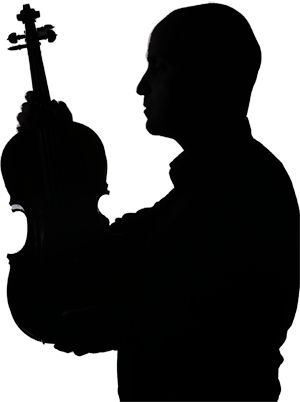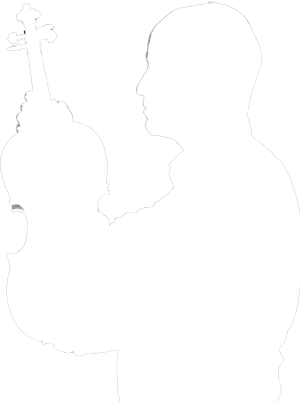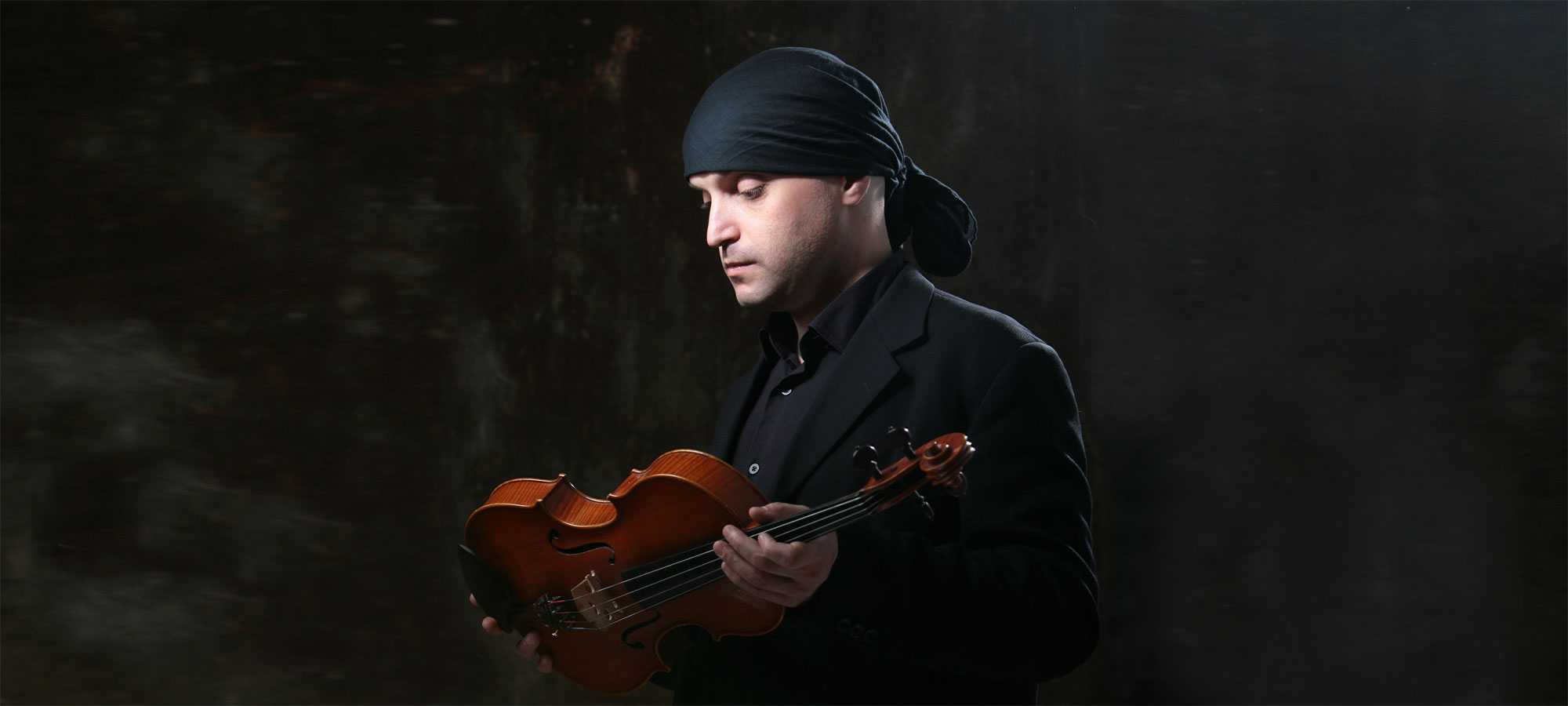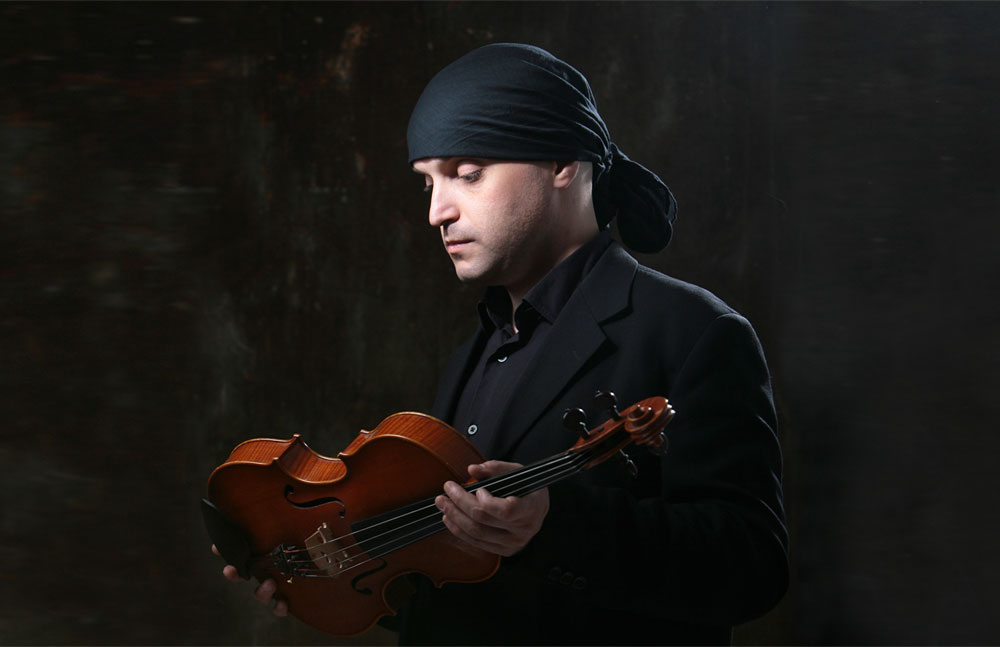
RECORDINGS
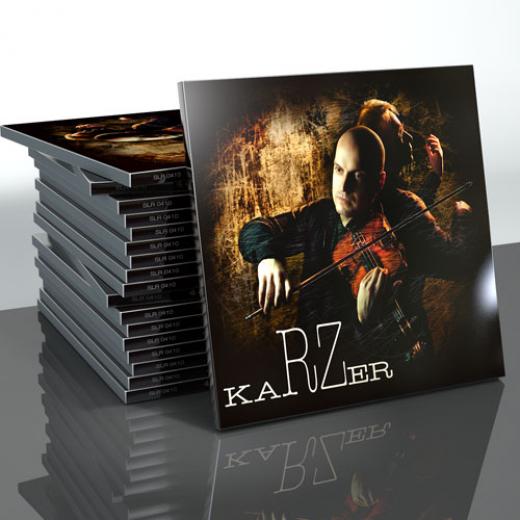
KARZER
Sergey KORNILOV
"KARZER"
4 concerts for violin and samplers
Misha BERKUT, violin
Sergey Kornilov's website (RU)
"Karzer" : twelve movements, combined into four concert cycles for solo violin and samplers or "The Four Times of the Day", as we called it during the recording. This is the only project in my performance practice, which has gone far beyond what I have been used to as a classical musician. And, although, the composer of the music is perhaps the most interesting and one of the earliest representatives of prog-rock in the USSR, composer Sergey Kornilov describes his album as a mix of rock and elements of classical music; according to my feelings in those days, it was certainly pure, albeit alternative rock.
This is how Kornilov himself describes the "Karzer" music:
"One day from the life of a man, where the real is intertwined with the virtual: his reflections on the events of this day"...
"Initially, it was not assumed that it would be sequential programme music, but rather more of a sequence of emotional states, during "that" day..."
"Erasure of the individual, personal ..., subordination to someone's metrics and to the patterns of the extra-personal... Countering in short, unsuccessful, emotional manifestations, and... withdrawal into contemplation, as an attempt to preserve oneself."
Sergey Kornilov
Member of the Russian Union of Composers, graduate of the Faculty of Music History, Theory and Composition of the Gorky (currently Nizhny Novgorod) Conservatory.
He graduated from the Conservatory (class of Professor Svetlana Savenko) with a paper on "The Artistic Evolution of the 'Yes' (Group) and the Problems of Art-Rock". He became composer and keyboardist of "Horizont" (or "Movement", as it was originally called), a rock group, which was considered one of the first, if not the first, prog-rock group in the USSR.
He works in the fields of studio, concert, theatre and film music.
His stylistic directions are a mix of traditional classical music and elements of rock music.
He is the composer of 10 albums of music for various electronic and acoustic musical instruments. Two of them were issued by "Melodiya" (the state-owned major record company/label of the Soviet Union): "Summer City", 1986 and "Portrait of a Boy", 1989 and reissued in CD-format, Boheme Music, 2000. Both albums were recorded in partnership with "Horizont" group.
Kornilov composed the "Fahrenheit 451" rock ballet, music for more than 15 dramatic performances and music for the "Airport" TV film series and documentary films.
Music written by Sergey Kornilov has been played by more than 60 theatres of the Soviet and post-Soviet states, in documentary films and TV movies.
The idea of this album "Karzer" belonged to Pavel Tomilov, a violinist from Nizhny Novgorod, who wanted Kornilov to write something for the violin and "something non-classical" in the style of Vivaldi's "The Four Seasons". At first, Sergey declined this idea due to other serious commitments and because of the fear that it might turn into techno acoustic fusion (or classical pop), which did not attract him at all. But a few months later, a second meeting took place, and the composer, having "conquered" complete freedom of the style, agreed to write the twelve movements, which were combined into four concert cycles using 'The Four Times of the Day' (as opposed to the four seasons) so with no direct analogies to Vivaldi. In October 1999, he began work on the album.
In May 2000, the material was completed in the form of a composer's demo with a sampler violin and a musical score - it was time to start recording the violin part. However, the solo violin part appeared to be more technically complicated than the violinist had expected, and Sergey categorically refused to have it simplified out of musical considerations. Everything stopped.
In the summer of the same year fate brought me as a performer to Nizhny Novgorod. I was already a little familiar with Kornilov, or rather with his music, thanks to his old friend Anatoly Pavlenko - the drummer and a colleague in the "Horizont" group, whom I had recently met in Moscow. I was delighted by the energy, novelty and absolute otherness of this music in comparison with everything that I had heard before. The classics, baroque, modern and minimalism - all of this was temporally pushed into the background, and I listened only to Kornilov - the few albums Pavlenko had left behind for me.
Not long before my journey to Nizhny Novgorod, I had met Sergey by phone, and learned of the existence of an album for violin. Although I was not still quite sure about myself in this style, I really wanted to listen to it.
In Nizhny Novgorod, Sergey came to my concert together with his colleague Evgeny Kalachev (the future co-producer of "Karzer") and then offered to go and listen to the demo. So we went and listened. This music was hypnotic. The energy was in full swing. We listened with headphones at full volume, for which my "classical" ears were not at all ready, but I gradually got used to it and realized that this exactly how it should be listened to.
Sergey is a very neat, smart and intelligent man, but as soon as he starts talking about music, he instantly becomes incredibly energetic and temperamental, he literally sparkles. He sprinkles the terms and the names of rock musicians I not only have never heard of but can't even remember.
The samplers written by Kornilov sound like live musical instruments, colourful, diverse, with nuances and character. Sometimes I still ask again whether it is a live musical instrument or human voice. I just can't believe this could be possible.
At first glance, the solo part seemed tough but playable, especially considering that for the beginning, it would be necessary to record and not to play live at the concert. I was still not sure if it was technically possible to play some places in principle, I agreed to make a try. I really enjoyed this music!
A few months later, I went to Nizhny Novgorod from Moscow with my violin and the sheet music for the first recording.
In the studio, many things turned out to be completely new for me, a classical musician who came to record a rock album for the first time in his life. Firstly, as it turned out, it was necessary to record with headphones on. Because I had to match rhythmically and intonationally with the already existing music, which was incredibly rich, both in its score and in colour, and rhythmic diversity, tempos, characters, etc. At the same time, I had to play as expressively as possible, without losing sight of the goal - the emotional component of the only "live" voice of the score. I thought that I would record my part, while the rest would be adjusted to it...
At first, nothing worked. I could not hear myself clearly in the headphones and could not accurately match either rhythmically or intonationally. After a while, on the recommendation of Arkady Anisimov, our sound engineer, I removed one headphone, which helped to some extent. I was listening to myself with one ear while listening to the recordings of the samplers in the headphone with the other one. The composer and the sound engineer helped me as much as possible: they could remove a couple of samplers from the score on the recording so that they would not prevent me from doing my job, they could add a metronome to make it easier for me to match with the already programmed accelerando or ritenuto. another difficulty in combining a live musical instrument with the non-live samplers became clear: it turned out to be incredibly difficult to intonate to them. The whole intonating experience I was used to when playing with other instruments appeared to be useless. Very often, in order to match intonationally in harmony with everything else, I felt I had to play out of tune. And rhythmically, I often had to trust my instincts and the invaluable guidance of the composer and sound engineer rather than my own ears. As a result, it was turning out as was needed. Compromises were not accepted, the recording was progressing very slowly, but no one wanted to sacrifice the quality, much less the emotions. We recorded music every night, taking short breaks to smoke a cigarette or two and to drink strong tea, until the moment when my hands, ears and brains refused to work from fatigue. We recorded as much as we could record during the days of my stay, then we made the arrangements for my next visit to complete the work.
In January 2001, I returned to complete the recording, and Arkady Anisimov, who by that time had edited several recorded numbers, was replaced by Vladimir Lutoshkin, a musician and sound engineer, Kornilov's old friend and a bandmate from "Horizont".
It was easier to work with Vladimir than with Arkady: he heard everything and understood me completely, as a musician himself who could play several musical instruments - guitar, flute and double bass, and the violin which he had learnt briefly at school. We recorded the violin part to the end with him, and, as it turned out, this was just the beginning. Next, we had to mix the remaining recorded material, which required tens, if not hundreds of hours of strenuous work. And exactly in this moment, the money allocated for the project ran out. Again everything stopped.
In the following years I often listened to the recorded numbers over and over again, especially No. 8 - "Freelance" - a spectacularly beautiful meditative song the all listeners "get high on". Attempts to find a sponsor to complete the work were unsuccessful as the project was too expensive.
After a long 8 years, in the summer of 2008, after a successful tour, I decided to spend my fee to finish the recording of the abandoned project. By that time, Kornilov and Lutoshkin had already moved to Moscow, which greatly facilitated our future work. I called Kornilov, and we arranged to meet. As a result, the work continued.
At the beginning of 2009, we continued to work with even greater enthusiasm and with an uncompromising attitude towards the slightest technical and musical flaws. Kornilov and Lutoshkin mixed what remained and remixed the already mixed numbers. It was already in the Moscow studio where, masterminded by Vladimir and Sergey, I rerecorded one song completely and several fragments from other tracks.
Lutoshkin recorded a guitar part instead of a sampler in three tracks (7, 9 and 12), which greatly increased the expressiveness and brightness of these numbers. Together with Sergey, he mixed and remastered the remaining songs. The album was finally completed!
I began to look for someone who could release a disc with the music of this style, and on the advice of my friends I found Andrey Gavrilov of Solyd Records.
At the same time, Mikhail Burlatsky, a poet and famous art photographer who works in the technique known as ambrotype, another old friend of Kornilov and Lutoshkin, took photographs for the CD cover. Vladimir Lutoshkin worked on the design and decoration and prepared everything for the release, while Sergey Kornilov and his son Dmitry came up with the names of the movements.
At the same time the final title of the CD was born. It was "Karzer", because although the title "The Four Times of the Day" sounded good programmatically, it was too long and did not completely convey the mood and the main idea of the album.
In 2012, the long-awaited disc was finally released on the Solyd Records label. However, nobody from us had enough time for its promotion. Under the contract with the record company, I received the whole release as the customer. The album attracted great attention in small circles of Russian professionals and music fans, but it was necessary to promote the album seriously for the widest publicity. Around the same time, I moved to another country, and many events happened in my life.
Only at the end of 2020, thanks to some spare time in light of recent developments, and, in particular, due to the fact that the "Karzer" concept became even more resonant with the current state of the world, I finally decided to publish the project. A project that started over 20 years ago and which is even more relevant today than at the time it was conceived.
-
1.In the rays of hope01:05
-
2.With a white thread00:42
-
3.Ice burning00:42
-
4.String loops00:32
-
5.Plebs' pasture00:41
-
6.Kissing blades00:39
-
7.Bear's Song00:38
-
8.Freelance00:40
-
9.Cover me00:44
-
10.Gesture of the darkness00:44
-
11.Vertical section00:42
-
12.Bottomless00:32
BUY IT NOW
Please feel free to contact us at info@mishaberkut.com if you prefer to use a payment service other than PayPal. We accept the payment via PayPal, wire transfer, TransferWise and instant transfers from card to card in roubles for music lovers located in Russia. You will receive the download links within 12 hours after we receive your payment.
If you would like to purchase a CD ALBUM, please email us also at info@mishaberkut.com with the quantity of CD's, your address and preferred form of payment. We will calculate the total price with the shipping costs and send you invoice for the payment.
